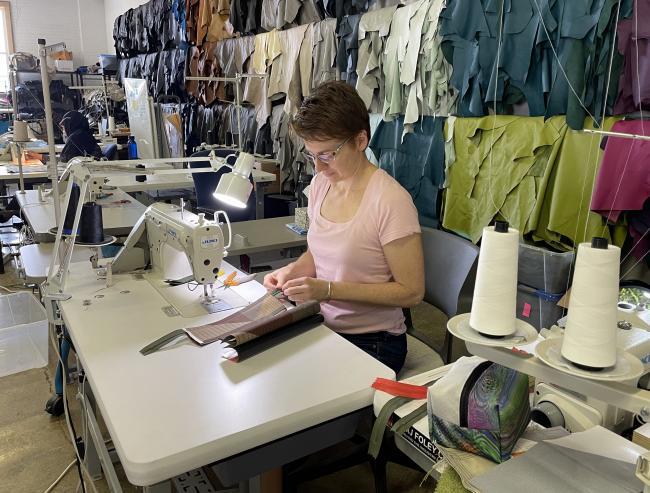Oct. 15, 2021, GRAND RAPIDS, Mich. – Public Thread, a Grand Rapids-based company, creates unique products by “upcycling” used materials, but the skills needed to create them are in great demand from a variety of local industries.
Grand Rapids Community College is teaming up with Public Thread, to create an industrial sewing certificate program to help students gain in-demand skills.
The pilot program, which starts on Oct. 26, trains people to operate the commercial sewing machines used in a variety of West Michigan industries, including automotive and furniture manufacturers. Average starting wages are between $17 and $23 per hour with full-time benefits.
“The new industrial sewing program is an example of how the community college partners with local employers to identify needs, then trains people to have skills leading to rewarding careers right here in West Michigan,” said Julie Parks, interim dean of GRCC’s School of Workforce Development. “Building a talented workforce creates opportunities for residents and strengthens our economy.”
Public Thread designs and creates products from surplus and scrap textiles obtained through partnerships with local manufacturers and suppliers, such as the furniture and billboard industries. Products include duffle bags, face coverings, clothing and even pet supplies.
The company, located at 1405 Buchanan Ave. SW, has a newly equipped sewing lab that will be used for the classes.
Students will learn the basics with an introduction to the sewing process, safety and ergonomics, sewing math as well as sewing equipment and operation.
The cost for Grand Rapids residents is $100 and $500 for those living outside the city. A portion of the cost of this program is being paid for by the One Workforce for West Michigan Manufacturing grant.
Lisa Knight, Public Thread’s COO, said the company is focused on creating opportunities for local residents as well as helping combat climate change.
“There are many textile and materials out there in our community already,” she said. “We were thinking about sustainability and zero waste, and looked at the problem with a creative mindset.”
Knight said she collects textiles that are considered scrap material from large manufacturers and finds new uses for them. The company created more than 70,000 face coverings in addition to laptop sleeves, tote bags and other products, which are sold online.
People interested in the class can contact GRCC Workforce Training via email at workforcetraining@grcc.edu, and by phone at (616) 234-3800.
